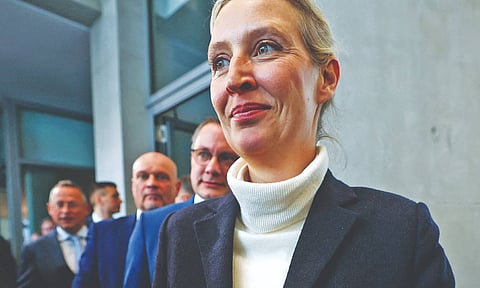

LEONIE DE JONGE
The far-right Alternative für Deutschland (AfD) looks set to become the second largest party in the German parliament following elections on February 23. Polls ahead of the election and an exit poll suggest they could receive around 20% of the final vote tally. For the first time, the AfD poses a challenge to mainstream parties’ longstanding strategy of isolating the far right. The rise of the AfD is striking, given the country’s history of authoritarianism and National Socialism during the 1930s and 1940s. For decades, far-right movements were generally stigmatised and treated as pariahs. Political elites, mainstream parties, the media and civil society effectively marginalised the far right and limited its electoral prospects.
The AfD’s breakthrough in the 2017 federal election shattered this status quo. Winning 12.6% of the vote and securing 94 Bundestag seats, it became Germany’s third-largest party — unlocking viable political space to the right of the centre-right party CDU/CSU for the first time in the postwar era. The AfD was founded in 2013 by disaffected CDU members. This included economics professors Bernd Lucke and Joachim Starbatty, and conservative journalists Konrad Adam and Alexander Gauland. It began as a single-issue, anti-euro party advocating Germany’s exit from the Eurozone. Dubbed a “party of professors”, it gained credibility through the support of academics and former mainstream politicians, lending it an “unusual gravitas” for a protest party. While nativist elements were arguably present from the start, the AfD was not initially conceived as a far-right party. When it first ran for the Bundestag in 2013, its four-page manifesto focused exclusively on dissolving the Eurozone. At the time, the party advocated political asylum for the persecuted and avoided harsh anti-immigrant or anti-Islam rhetoric, cultivating more of a “bourgeois” image.
This helped the AfD build what political scientist Elisabeth Ivarsflaten has called a reputational shield — a legacy used to deflect social stigma and accusations of extremism. Initially, the AfD distanced itself from far-right parties in neighbouring countries. However, successive leadership changes between 2015 and 2017 saw the party adopt a more hardline position, particularly on immigration, Islam and national identity. By 2016, its platform had largely aligned with those of populist radical right parties elsewhere.
Today, the party can unequivocally be classified as far right. This umbrella term captures the growing links between “(populist) radical right” (illiberal-democratic) and “extreme right” (anti-democratic) parties and movements. Ideologically, the far right is characterised by nativism and authoritarianism.
Nativism is a xenophobic form of nationalism, which holds that non-native elements form a threat to the homogeneous nation-state. In Germany, nativism carries a historical legacy. “Völkisch nationalism” was one of the core ideas of the 19th and early 20th centuries that was broadly adopted by National Socialism to justify deportations and, ultimately, the Holocaust. Völkisch ideology is based on the essentialist idea that the German people are inextricably connected to the soil. Thus, other people cannot be part of the völkisch community. The AfD has evolved into a far-right party by continuously radicalising its positions. It acted like a Trojan horse, importing völkisch nationalist ideology into the parliamentary and public arena, which used to be blocked by the gatekeeping mechanisms of German democracy. AfD carved out a niche for itself by advocating stricter anti-immigration policies. This came in response to the so-called “refugee crisis”, when then-Chancellor Angela Merkel welcomed more than a million asylum seekers into Germany. At its campaign kickoff rally in January 2025, AfD’s chancellor candidate Alice Weidel vowed to implement “large-scale repatriations” (or “remigration”) of immigrants.
The party advocates a return to a blood-based citizenship, insisting that, with very few exceptions for well-assimilated migrants, citizenship can only be determined by ancestry and bloodline rather than birthright. Additionally, the party upholds the white, nuclear family as an ideal and has pledged to dismiss university professors accused of promoting “leftist, woke gender ideology”. The party also calls for the immediate lifting of sanctions against Russia and opposes weapons deliveries to Ukraine.